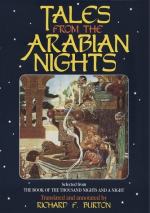End of Vol. 3
Arabian Nights,
Volume 3
Footnotes
[FN#1] This “horripilation,” for which we have the poetical term “goose-flesh,” is often mentioned in Hindu as in Arab literature.
[FN#2] How often we have heard this in England!
[FN#3] As a styptic. The scene in the text has often been enacted in Egypt where a favourite feminine mode of murdering men is by beating and bruising the testicles. The Fellahs are exceedingly clever in inventing methods of manslaughter. For some years bodies were found that bore no outer mark of violence, and only Frankish inquisitiveness discovered that the barrel of a pistol had been passed up the anus and the weapon discharged internally Murders of this description are known in English history; but never became popular practice.
[FN#4] Arab. “Zakar,” that which betokens masculinity. At the end of the tale we learn that she also gelded him; thus he was a “Sandal),” a rase.
[FN#5] See vol. i. p. 104. {see Volume 1, Note 188}
[FN#6] The purity and intensity of her love had attained to a something of prophetic strain.
[FN#7] Lane corrupts this Persian name to Shah Zeman (i. 568).
[FN#8] i.e. the world, which includes the ideas of Fate, Time, Chance.
[FN#9] Arab. “Barid,” silly, noyous, contemptible; as in the proverb
Two things than ice
are colder cold:—
An old man young, a
young man old.
A “cold-of-countenance"=a fool: “May Allah make cold thy face!"=may it show want and misery. “By Allah, a cold speech!"=a silly or abusive tirade (Pilgrimage, ii. 22).
[FN#10] The popular form is, “often the ear loveth before the eye.”
[FN#11] Not the first time that royalty has played this prank, nor the last, perhaps.
[FN#12] i.e. the Lady Dunya.
[FN#13] These magazines are small strongly-built rooms on the ground floor, where robbery is almost impossible.
[FN#14] Lit. “approbation,” “benediction”; also the Angel who keeps the Gates of Paradise and who has allowed one of the Ghilman (or Wuldan) the boys of supernatural beauty that wait upon the Faithful, to wander forth into this wicked world.
[FN#15] In Europe this would be a plurale majestatis, used only by Royalty. In Arabic it has no such significance, and even the lower orders apply it to themselves; although it often has a soupon of “I and thou.”
[FN#16] Man being an “extract of despicable water” (Koran xxxii. 7) ex spermate genital), which Mr. Rodwell renders “from germs of life,” “from sorry water.”
[FN#17] i.e. begotten by man’s seed in the light of salvation (Nur al-huda).
[FN#18] The rolls of white (camphor-like) scarf-skin and sordes which come off under the bathman’s glove become by miracle of Beauty, as brown musk. The Rubber or Shampooer is called in Egypt “Mukayyis” (vulgarly “Mukayyisati”) or “bagman,” from his “Kis,” a bag-glove of coarse woollen stuff. To “Johnny Raws” he never fails to show the little rolls which come off the body and prove to them how unclean they are, but the material is mostly dead scarf-skin




